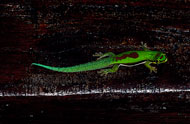Description:
A 15-gallon aquarium can be home for a pair of these petite lizards, especially if it’s well-planted in live foliage that increases the surface area available for the lined day geckos to explore. Lined day geckos will wander every inch of their homes and get to know certain spots for basking, hiding and where you offer food. They tend to be most active during daylight hours where they can be viewed easily. Once lined day geckos become used to your presence, most will not flee in fright as they may do at first. Lined day geckos love small insects like small crickets, immature mealworms and waxworms. They also have a sweet tooth for fruit-flavored baby food of the finely strained types. Lined day geckos will also lick pieces of over-ripe fruit like peaches, strawberries, melons, etc. It’s best, though, to make insects 90 percent of their diets, and save the fruit treats for once a week, so they don’t become obese. Baby food also tends to get tracked on the cage glass and makes it necessary to clean it more often. Water is best administered by spraying from a mist bottle, but a small water bowl doesn’t hurt. Keep it very clean by changing it daily so it doesn’t stagnate from sitting when detritus lands in it. Let a warm light bathe the cage on one end for 8 to 12 hours per day as a basking light to mimic the sun. Put one piece of a hollow log or section of bamboo so the lined day geckos can hide, and also as a place for the pairs of eggs to be glued if you maintain a sexual pair. Pairs breed readily in captivity. Eggs will hatch in roughly two months if left in the cage at temperatures between 65 and 88 degrees Fahrenheit.
Habitat:
Open, sunny fringes of forests
Range:
Madagascar
Scientific Name: Phelsuma lineata
Species Group: gecko
Family: Gekkonidae
Size: 4 to 6 inches
Level: beginner
Weight:
Dangerous: No



